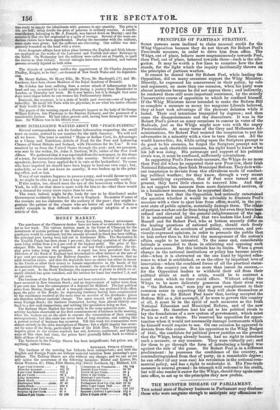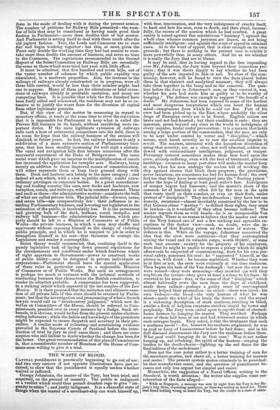THE MONSTER DISEASE OF PARLIAMENT.
THE actual state of Railway business in Parliament may disabuse those who were sanguine enough to anticipate any efficacious re- form in the mode of dealing with it during the present session. The number of petitions for Railway Bills presented—the num- ber of bills that may be considered as having made good their footing in Parliament—more than doubles that of last session. And Parliament is setting itself to deal with them much after the old jogtrot fashion. True? the Lords and Commons are to start fair and begin working together : but this, at most, gives the Peers only double the working time they had last session to over- take more than double the amount of business, and saves no time to the Commons. The regulations recommended in the Second ateport of the Select Committee on Railway Bills are essentially the same as those which were tried last year with little effect. form in the mode of dealing with it during the present session. The number of petitions for Railway Bills presented—the num- ber of bills that may be considered as having made good their footing in Parliament—more than doubles that of last session. And Parliament is setting itself to deal with them much after the old jogtrot fashion. True? the Lords and Commons are to start fair and begin working together : but this, at most, gives the Peers only double the working time they had last session to over- take more than double the amount of business, and saves no time to the Commons. The regulations recommended in the Second ateport of the Select Committee on Railway Bills are essentially the same as those which were tried last year with little effect. It must be admitted, that five hundred and seven bills, out of the vaster number of schemes by which public cupidity was stimulated, is a moderate proportion. Also, the increase to the mileage of railways already constructed or in progress, were all these bills carried, would be less than their number might lead one to suppose. Many of them are for alterations or brief exten- sions of railways already in profitable operation, and many are competing lines. It is possible that when the five hundred have been fairly sifted and winnowed, the residuum may not be so ex- tensive as to justify the worst fears for the diversion of capital from other legitimate pursuits. But, if this view of the matter be reassuring in regard to monetary affairs, it tends at the same time to rivet the conviction that it is impossible for Parliament to keep what is called the Private Bill business in its hands, without sacrificing more im- portant duties. If the mere legitimate extension of railways calls such a host of substantial competitors into the field, there is no room for hope that the railway business of the session will diminish in future years. In fact, the railway business is only a subdivision of a more extensive section of Parliamentary busi- ness, that has been steadily increasing for well nigh a century. The canal and navigation bills first became numerous after the successful experiment of the Duke of Bridgewater. The same social want which gave an impetus to the multiplication of canals has increased the application for turnpike acts. Railways, being merely an addition to those improved means of communication, will either supersede them or keep their ground along with them. Dock and harbour acts belong to the same category ; and indeed all acts which, with a view to public utility, confer extra- ordinary privileges on corporate bodies. In a great manufactur- ing and trading country like ours, new docks and harbours, new turnpikes, canals, and railways, will be in constant demand. These and such as these—the administrative section—constitute the bulk of what are called private bills. The judicial bills—divorce, name, and estate bills—are comparatively few : their influence in re- tarding Parliamentary business, and lowering our legislators in the estimation of the public, is incalculably less. It is the permanent and growing bulk of the dock, harbour, canal, turnpike, and railway bill business—the administrative business, which pro- perly should be left to a Minister of Commerce or of Public Works—the private business, in which a man may shuffle and equivocate without exposing himself to the charge of violating public principle, and in which he is tempted to job in order to strengthen himself in his seat—that threatens to corrupt the Legislature and render it contemptible.
Strict theory would recommend, that, confining itself to the purely legislative task of laying down general regulations for the circumstances and conditions under which functions which of right appertain to Government—power to construct works of public utility—may be delegated to private individuals or corporations—Parliament should leave the special application of these rules in particular cases to a responsible Minister of Commerce or of Public Works. But such an arrangement is perhaps too much at variance with the informal methods of conducting business that characterize the British constitution, to render its adoption probable. A compromise has been suggested, in a striking article which appeared in the last number of the Law Review". It is there proposed that the initiation and ultimate sanc- tion of all private bills of this class should be retained by Parlia- ment; but that the investigation and pronouncing of what a Scotch lawyer would call an " interlocutory judgment," which now de- volves on Committees of the House, should be referred to Com- missioners, presided over in every instance by a Judge. Such tri- bunals, it is obvious, would be free from the present undue election- eering influences ; while the habits and knowledge of the presidents might be expected to insure despatch and accuracy in their pro- cedure. A similar mode of collecting and scrutimung evidence prevailed in the Supreme Courts of Scotland before the intro- duction of trial by jury in civil cases there ; and there are some sceptics who still incline to doubt whether the change has been for the better. One great recommendation of this plan of Commissions is, that a considerable number of Members of the House of Com- mons seem willing to give it a trial.



























 Previous page
Previous page